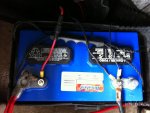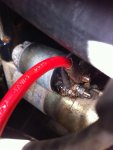LippCJ7
Vice Admiral
- Joined
- Sep 20, 2010
- Messages
- 5,431
Re: What is Draining My Battery?
Jcornell,
Ok so by hooking up the jumpbox directly to the battery you are telling me that the ground between the engine and the battery should be fine, you are not removing it from the system when jump starting it.
You are measuring battery voltage when you go from post to post should be 14(plus or minus) when the boat is running and 12-13 when not running. positive DVM probe to positive battery post and negative DVM probe to negative battery post, again do not measure through the terminal on the battery posts since they could be part of the problem go directly to the post.
While you are at it switch your dvm to ohms, measure on the >100 ohms scale(just generalizing here not knowing what you have or are going to get could be the 20 ohms scale) and measure from the negative battery post to the engine block, should be zero but who knows what you will see, this is called resistance and in the electrical system resistance is very bad, more is bad, less is good. You can use this across the battery terminals as well, measure from the battery post to the next clean connection you can find, you are measuring the resistance through that section of line including the terminal, you can do this on positive and negative.
Jcornell,
Ok so by hooking up the jumpbox directly to the battery you are telling me that the ground between the engine and the battery should be fine, you are not removing it from the system when jump starting it.
You are measuring battery voltage when you go from post to post should be 14(plus or minus) when the boat is running and 12-13 when not running. positive DVM probe to positive battery post and negative DVM probe to negative battery post, again do not measure through the terminal on the battery posts since they could be part of the problem go directly to the post.
While you are at it switch your dvm to ohms, measure on the >100 ohms scale(just generalizing here not knowing what you have or are going to get could be the 20 ohms scale) and measure from the negative battery post to the engine block, should be zero but who knows what you will see, this is called resistance and in the electrical system resistance is very bad, more is bad, less is good. You can use this across the battery terminals as well, measure from the battery post to the next clean connection you can find, you are measuring the resistance through that section of line including the terminal, you can do this on positive and negative.





















